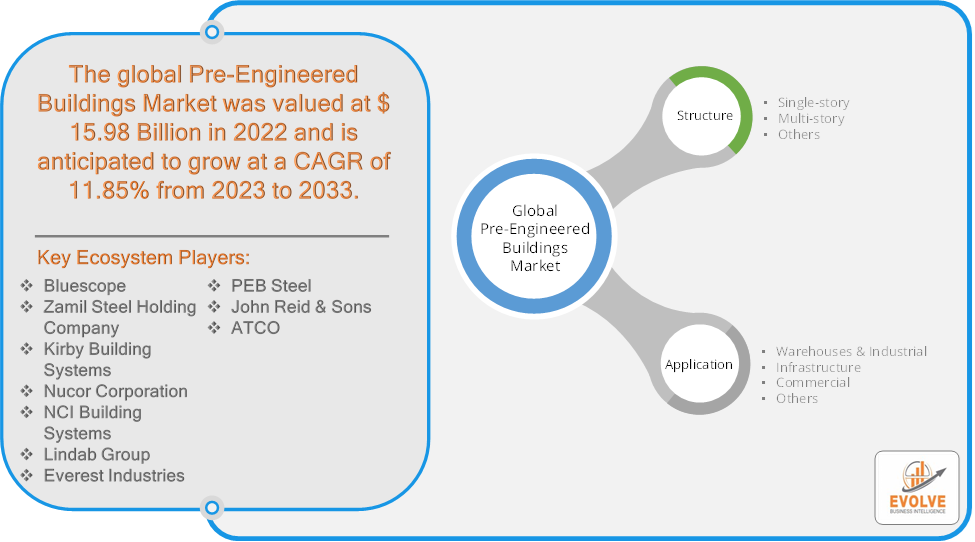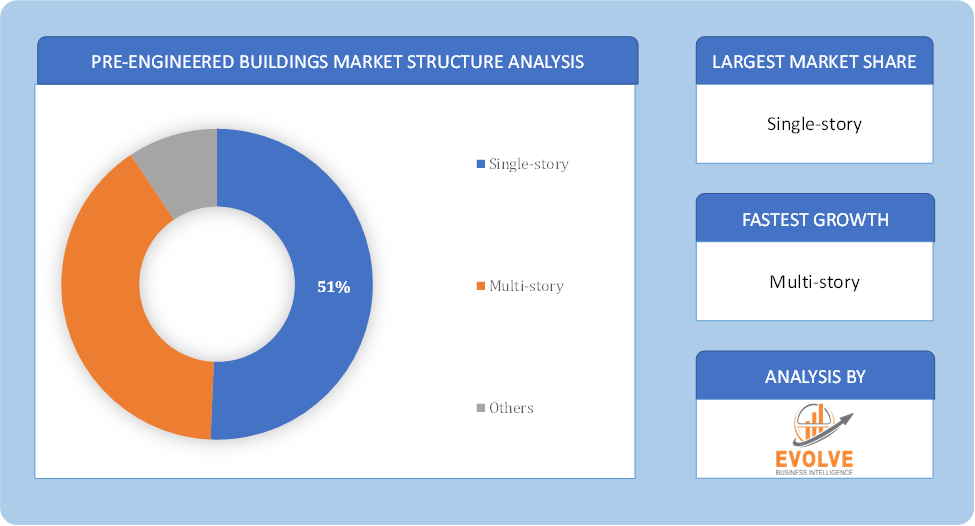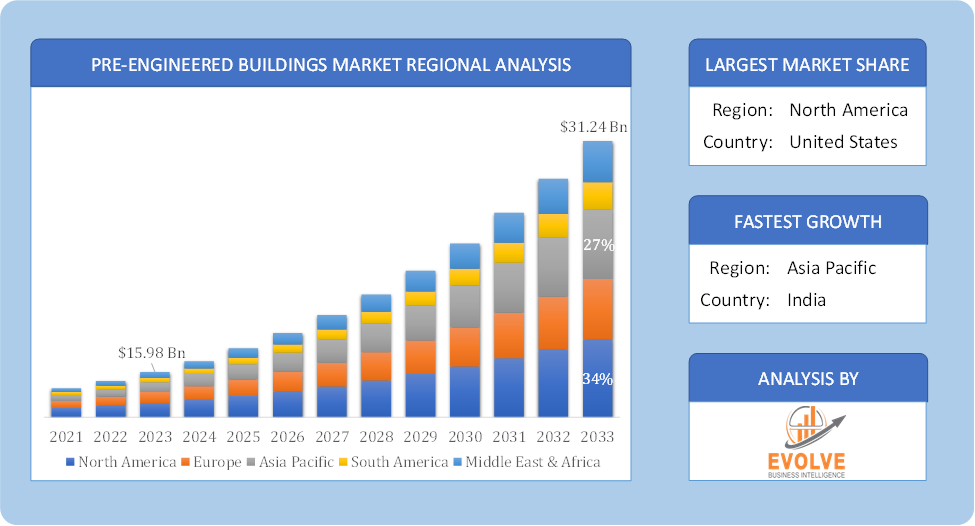Pre-Engineered Buildings Market Analysis and Global Forecast 2023-2033
$ 1,390.00 – $ 5,520.00Price range: $ 1,390.00 through $ 5,520.00
Pre-Engineered Buildings Market Research Report: Information By Structure (Single-story, Multi-story, Others), By Application (Warehouses & Industrial, Infrastructure, Commercial, Others), and by Region — Forecast till 2033
Page: 162
Pre-Engineered Buildings Market Overview
The Pre-Engineered Buildings Market Size is expected to reach USD 31.24 Billion by 2033. The Pre-Engineered Buildings Market industry size accounted for USD 15.98 Billion in 2023 and is expected to expand at a compound annual growth rate (CAGR) of 11.85% from 2023 to 2033. The Pre-Engineered Buildings (PEB) Market refers to the sector focused on the design, manufacturing, and installation of pre-engineered buildings. These buildings are constructed using a pre-designed set of materials and components, typically made of steel, which are fabricated in a factory and then assembled on-site.
The PEB market is continuously evolving with advancements in technology and materials, driving the development of more efficient and innovative building solutions.
Global Pre-Engineered Buildings Market Synopsis
 COVID-19 Impact Analysis
COVID-19 Impact Analysis
The COVID-19 pandemic had a significant impact on the Pre-Engineered Buildings (PEB) Market. The pandemic caused disruptions in the supply of raw materials, such as steel, due to factory shutdowns and transportation restrictions. Global and local transportation faced delays, affecting the delivery of pre-engineered components and materials. Lockdowns and social distancing measures led to the suspension of many construction projects, delaying the installation of PEBs. Restrictions on movement and health concerns affected the availability of labor, slowing down construction and assembly processes. There was an increased demand for temporary structures, such as field hospitals and quarantine centers, which could be rapidly deployed using PEB technology. The pandemic accelerated the adoption of digital tools and technologies in the construction industry, including Building Information Modeling (BIM) and remote project management, which can enhance the efficiency of PEB projects. The focus on sustainability and green building practices gained prominence, with PEBs being seen as a more sustainable and efficient building option.
Pre-Engineered Buildings Market Dynamics
The major factors that have impacted the growth of Pre-Engineered Buildings Market are as follows:
Drivers:
Ø Cost Efficiency and Time Savings
PEBs are typically more cost-effective than traditional construction methods due to standardized design and mass production. The materials used in PEBs, such as galvanized steel, require less maintenance and have longer lifespans. Pre-engineered components can be manufactured simultaneously with site preparation, significantly reducing construction time. The modular nature of PEBs allows for rapid assembly on-site, enabling quicker project completion. Advances in design software (e.g., BIM) and manufacturing technologies enhance the precision and quality of PEBs. Development of new materials and coatings that improve the durability and performance of PEBs. The boom in e-commerce has led to a surge in demand for warehouses and distribution centers, where PEBs are often used.
Restraint:
- Perception of High Initial Investment and Fluctuating Raw Material Prices
The primary material for PEBs is steel, and fluctuations in steel prices can impact overall project costs and profitability. Disruptions in the supply chain for raw materials can lead to delays and increased costs. Although PEBs are cost-effective in the long run, the initial investment required for design, manufacturing, and assembly can be high, deterring some potential clients. Securing financing for PEB projects can be challenging, especially for smaller companies or in regions with limited access to capital.
Opportunity:
⮚ Green Building and Sustainability
Increasing emphasis on sustainability and energy efficiency presents opportunities for PEBs, which can be designed with eco-friendly materials and energy-efficient features. PEBs can be designed to meet green building certifications, such as LEED, enhancing their appeal to environmentally conscious clients. PEBs can be quickly deployed for disaster relief, temporary housing, or medical facilities, offering a solution for urgent and temporary needs. The ability to reconfigure or relocate PEBs makes them suitable for temporary and emergency applications. Utilizing advanced design tools and technologies, such as Building Information Modeling (BIM), can improve the efficiency and accuracy of PEB projects.
Pre-Engineered Buildings Market Segment Overview
 By Structure
By Structure
Based on Structure, the market is segmented based on Single-story, Multi-story and Others. The Single-story segment dominant the market. Single-story pre-engineered buildings are gaining traction due to their cost-effectiveness and rapid production compared to factory-made homes or RCC construction. These structures are quickly constructible and can be customized to meet specific needs, making them ideal for disaster relief shelters. Their design flexibility and easy transportation enhance their demand for temporary kitchens, vocational houses, and other facilities. The affordability and space efficiency of single-story pre-engineered buildings make them increasingly popular, especially as urban spaces become more constrained.
By Application
Based on Application, the market segment has been divided into Warehouses & Industrial, Infrastructure, Commercial and Others. The Warehouses & Industrial segment dominant the market.
Global Pre-Engineered Buildings Market Regional Analysis
Based on region, the global Pre-Engineered Buildings Market has been divided into North America, Europe, Asia-Pacific, the Middle East & Africa, and Latin America. North America is projected to dominate the use of the Pre-Engineered Buildings Market followed by the Asia-Pacific and Europe regions.
 Pre-Engineered Buildings North America Market
Pre-Engineered Buildings North America Market
North America holds a dominant position in the Pre-Engineered Buildings Market. The North American PEB market is well-established, with significant demand driven by industrial, commercial, and warehouse applications. Urbanization, industrial expansion, and the focus on sustainable construction practices contribute to market growth and there is increasing interest in energy-efficient and environmentally friendly building solutions, including smart PEBs with integrated technologies.
Pre-Engineered Buildings Asia-Pacific Market
The Asia-Pacific region has indeed emerged as the fastest-growing market for the Pre-Engineered Buildings Market industry. The Asia-Pacific region is experiencing rapid growth in the PEB market, driven by rapid urbanization and industrialization. Growing economies, increasing infrastructure investments, and a rising demand for cost-effective and scalable construction solutions and there is a significant focus on expanding industrial facilities, commercial spaces, and logistics infrastructure. Emerging markets in countries like India, China, and Southeast Asia are key growth areas.
Competitive Landscape
The global Pre-Engineered Buildings Market is highly competitive, with numerous players offering a wide range of software solutions. The competitive landscape is characterized by the presence of established companies, as well as emerging startups and niche players. To increase their market position and attract a wide consumer base, the businesses are employing various strategies, such as product launches, and strategic alliances.
Prominent Players:
- Bluescope
- Zamil Steel Holding Company
- Kirby Building Systems
- Nucor Corporation
- NCI Building Systems
- Lindab Group
- Everest Industries
- PEB Steel
- John Reid & Sons
- ATCO
Key Development
In July 2022, APL Apollo, an Indian producer of structural steel pipes, has launched next-gen steel building solutions that will benefit pre-engineered buildings for their cost-effectiveness, faster speed, and superior quality.
In June 2022, Nucor has agreed to acquire Summit Utility Structures LLC, Sovereign Steel Manufacturing LLC, and another manufacturer of steel utility structures to serve the customers of North America.
Scope of the Report
Global Pre-Engineered Buildings Market, by Structure
- Single-story
- Multi-story
- Others
Global Pre-Engineered Buildings Market, by Application
- Warehouses & Industrial
- Infrastructure
- Commercial
- Others
Global Pre-Engineered Buildings Market, by Region
- North America
- US
- Canada
- Mexico
- Europe
- UK
- Germany
- France
- Italy
- Spain
- Benelux
- Nordic
- Rest of Europe
- Asia Pacific
- China
- Japan
- South Korea
- Indonesia
- Austalia
- Malaysia
- India
- Rest of Asia Pacific
- South America
- Brazil
- Argentina
- Rest of South America
- Middle East & Africa
- Saudi Arabia
- UAE
- Egypt
- South Africa
- Rest of Middle East & Africa
| Parameters | Indicators |
|---|---|
| Market Size | 2033: USD 31.24 Billion |
| CAGR (2023-2033) | 11.85% |
| Base year | 2022 |
| Forecast Period | 2023-2033 |
| Historical Data | 2021 (2017 to 2020 On Demand) |
| Report Coverage | Revenue Forecast, Competitive Landscape, Growth Factors, and Trends |
| Key Segmentations | Structure, Application |
| Geographies Covered | North America, Europe, Asia-Pacific, South America, Middle East, Africa |
| Key Vendors | Bluescope, Zamil Steel Holding Company, Kirby Building Systems, Nucor Corporation, NCI Building Systems, Lindab Group, Everest Industries, PEB Steel, John Reid & Sons and ATCO. |
| Key Market Opportunities | · Green Building and Sustainability · Disaster Relief |
| Key Market Drivers | · Cost Efficiency and Time Savings · Technological Advancements |
REPORT CONTENT BRIEF:
- High-level analysis of the current and future Pre-Engineered Buildings Market trends and opportunities
- Detailed analysis of current market drivers, restraining factors, and opportunities in the future
- Pre-Engineered Buildings Market historical market size for the year 2021, and forecast from 2023 to 2033
- Pre-Engineered Buildings Market share analysis at each product level
- Competitor analysis with detailed insight into its product segment, Government & Defense strength, and strategies adopted.
- Identifies key strategies adopted including product launches and developments, mergers and acquisitions, joint ventures, collaborations, and partnerships as well as funding taken and investment done, among others.
- To identify and understand the various factors involved in the global Pre-Engineered Buildings Market affected by the pandemic
- To provide a detailed insight into the major companies operating in the market. The profiling will include the Government & Defense health of the company’s past 2-3 years with segmental and regional revenue breakup, product offering, recent developments, SWOT analysis, and key strategies.
Frequently Asked Questions (FAQ)
What is the study period of this market?
The study period of the global Pre-Engineered Buildings Market is 2021- 2033
What is the growth rate of the global Pre-Engineered Buildings Market?
The global Pre-Engineered Buildings Market is growing at a CAGR of 11.85% over the next 10 years
Which region has the highest growth rate in the market of Pre-Engineered Buildings Market?
Asia Pacific is expected to register the highest CAGR during 2023-2033
Which region has the largest share of the global Pre-Engineered Buildings Market?
North America holds the largest share in 2022
Who are the key players in the global Pre-Engineered Buildings Market?
Bluescope, Zamil Steel Holding Company, Kirby Building Systems, Nucor Corporation, NCI Building Systems, Lindab Group, Everest Industries, PEB Steel, John Reid & Sons and ATCO are the major companies operating in the market.
Do you offer Post Sale Support?
Yes, we offer 16 hours of analyst support to solve the queries
Do you sell particular sections of a report?
Yes, we provide regional as well as country-level reports. Other than this we also provide a sectional report. Please get in contact with our sales representatives.
Press Release

Global Pharmaceutical Manufacturing Market to Reach $1.38 Trillion by 2035 with 7.35% CAGR, New Research Shows

The Global Mammography Market Is Estimated To Record a CAGR of Around 10.29% During The Forecast Period

Glue Stick Market to Reach USD 2.35 Billion by 2034

Podiatry Service Market to Reach USD 11.88 Billion by 2034

Microfluidics Technology Market to Reach USD 32.58 Billion by 2034

Ferric Chloride Market to Reach USD 10.65 Billion by 2034

Family Practice EMR Software Market to Reach USD 21.52 Billion by 2034

Electric Hairbrush Market to Reach USD 15.95 Billion by 2034

Daily Bamboo Products Market to Reach USD 143.52 Billion by 2034

Cross-border E-commerce Logistics Market to Reach USD 112.65 Billion by 2034
Table of Content
Chapter 1. Executive Summary Chapter 2. Scope Of The Study 2.1. Market Definition 2.2. Scope Of The Study 2.2.1. Objectives of Report 2.2.2. Limitations 2.3. Market Structure Chapter 3. Evolve BI Methodology Chapter 4. Market Insights and Trends 4.1. Supply/ Value Chain Analysis 4.1.1. Raw End Users Providers 4.1.2. Manufacturing Process 4.1.3. Distributors/Retailers 4.1.4. End-Use Industry 4.2. Porter’s Five Forces Analysis 4.2.1. Threat Of New Entrants 4.2.2. Bargaining Power Of Buyers 4.2.3. Bargaining Power Of Suppliers 4.2.4. Threat Of Substitutes 4.2.5. Industry Rivalry 4.3. Impact Of COVID-19 on the Pre-Engineered Buildings Market 4.3.1. Impact on Market Size 4.3.2. End-Use Industry Trend, Preferences, and Budget Impact 4.3.3. Regulatory Framework/Government Policies 4.3.4. Key Players' Strategy to Tackle Negative Impact 4.3.5. Opportunity Window 4.4. Technology Overview 12.28. Macro factor 4.6. Micro Factor 4.7. Demand Supply Gap Analysis of the Pre-Engineered Buildings Market 4.8. Import Analysis of the Pre-Engineered Buildings Market 4.9. Export Analysis of the Pre-Engineered Buildings Market Chapter 5. Market Dynamics 5.1. Introduction 5.2. DROC Analysis 5.2.1. Drivers 5.2.2. Restraints 5.2.3. Opportunities 5.2.4. Challenges 5.3. Patent Analysis 5.4. Industry Roadmap 5.5. Parent/Peer Market Analysis Chapter 6. Global Pre-Engineered Buildings Market, By Structure 6.1. Introduction 6.2. Single-story 6.3. Multi-story 6.4. Others Chapter 7. Global Pre-Engineered Buildings Market, By Application 7.1. Introduction 7.2. Warehouses & Industrial 7.3. Infrastructure 7.4 Commercial 7.5. Others Chapter 8. Global Pre-Engineered Buildings Market, By Region 8.1. Introduction 8.2. North America 8.2.1. Introduction 8.2.2. Driving Factors, Opportunity Analyzed, and Key Trends 8.2.3. Market Size and Forecast, By Country, 2023-2033 8.2.4. Market Size and Forecast, By Product Type, 2023-2033 8.2.5. Market Size and Forecast, By End User, 2023-2033 8.2.6. US 8.2.6.1. Introduction 8.2.6.2. Driving Factors, Opportunity Analyzed, and Key Trends 8.2.6.3. Market Size and Forecast, By Product Type, 2023-2033 8.2.6.4. Market Size and Forecast, By End User, 2023-2033 8.2.7. Canada 8.2.7.1. Introduction 8.2.7.2. Driving Factors, Opportunity Analyzed, and Key Trends 8.2.7.4. Market Size and Forecast, By Product Type, 2023-2033 8.2.7.5. Market Size and Forecast, By End User, 2023-2033 8.3. Europe 8.3.1. Introduction 8.3.2. Driving Factors, Opportunity Analyzed, and Key Trends 8.3.3. Market Size and Forecast, By Country, 2023-2033 8.3.4. Market Size and Forecast, By Product Type, 2023-2033 8.3.5. Market Size and Forecast, By End User, 2023-2033 8.3.6. Germany 8.3.6.1. Introduction 8.3.6.2. Driving Factors, Opportunity Analyzed, and Key Trends 8.3.6.3. Market Size and Forecast, By Product Type, 2023-2033 8.3.6.4. Market Size and Forecast, By End User, 2023-2033 8.3.7. France 8.3.7.1. Introduction 8.3.7.2. Driving Factors, Opportunity Analyzed, and Key Trends 8.3.7.3. Market Size and Forecast, By Product Type, 2023-2033 8.3.7.4. Market Size and Forecast, By End User, 2023-2033 8.3.8. UK 8.3.8.1. Introduction 8.3.8.2. Driving Factors, Opportunity Analyzed, and Key Trends 8.3.8.3. Market Size and Forecast, By Product Type, 2023-2033 8.3.8.4. Market Size and Forecast, By End User, 2023-2033 8.3.9. Italy 8.3.9.1. Introduction 8.3.9.2. Driving Factors, Opportunity Analyzed, and Key Trends 8.3.9.3. Market Size and Forecast, By Product Type, 2023-2033 8.3.9.4. Market Size and Forecast, By End User, 2023-2033 8.3.11. Rest Of Europe 8.3.11.1. Introduction 8.3.11.2. Driving Factors, Opportunity Analyzed, and Key Trends 8.3.11.3. Market Size and Forecast, By Product Type, 2023-2033 8.3.11.4. Market Size and Forecast, By End User, 2023-2033 8.4. Asia-Pacific 8.4.1. Introduction 8.4.2. Driving Factors, Opportunity Analyzed, and Key Trends 8.4.3. Market Size and Forecast, By Country, 2023-2033 8.4.4. Market Size and Forecast, By Product Type, 2023-2033 8.12.28. Market Size and Forecast, By End User, 2023-2033 8.4.6. China 8.4.6.1. Introduction 8.4.6.2. Driving Factors, Opportunity Analyzed, and Key Trends 8.4.6.3. Market Size and Forecast, By Product Type, 2023-2033 8.4.6.4. Market Size and Forecast, By End User, 2023-2033 8.4.7. India 8.4.7.1. Introduction 8.4.7.2. Driving Factors, Opportunity Analyzed, and Key Trends 8.4.7.3. Market Size and Forecast, By Product Type, 2023-2033 8.4.7.4. Market Size and Forecast, By End User, 2023-2033 8.4.8. Japan 8.4.8.1. Introduction 8.4.8.2. Driving Factors, Opportunity Analyzed, and Key Trends 8.4.8.3. Market Size and Forecast, By Product Type, 2023-2033 8.4.8.4. Market Size and Forecast, By End User, 2023-2033 8.4.9. South Korea 8.4.9.1. Introduction 8.4.9.2. Driving Factors, Opportunity Analyzed, and Key Trends 8.4.9.3. Market Size and Forecast, By Product Type, 2023-2033 8.4.9.4. Market Size and Forecast, By End User, 2023-2033 8.4.10. Rest Of Asia-Pacific 8.4.10.1. Introduction 8.4.10.2. Driving Factors, Opportunity Analyzed, and Key Trends 8.4.10.3. Market Size and Forecast, By Product Type, 2023-2033 8.4.10.4. Market Size and Forecast, By End User, 2023-2033 8.5. Rest Of The World (RoW) 8.5.1. Introduction 8.5.2. Driving Factors, Opportunity Analyzed, and Key Trends 8.5.3. Market Size and Forecast, By Product Type, 2023-2033 8.5.4. Market Size and Forecast, By End User, 2023-2033 Chapter 9. Company Landscape 9.1. Introduction 9.2. Vendor Share Analysis 9.3. Key Development Analysis 9.4. Competitor Dashboard Chapter 10. Company Profiles 10.1. Bluescope 10.1.1. Business Overview 10.1.2. Government & Defense Analysis 10.1.2.1. Government & Defense – Existing/Funding 10.1.3. Product Portfolio 10.1.4. Recent Development and Strategies Adopted 10.1.5. SWOT Analysis 10.2. Zamil Steel Holding Company 10.2.1. Business Overview 10.2.2. Government & Defense Analysis 10.2.2.1. Government & Defense – Existing/Funding 10.2.3. Product Portfolio 10.2.4. Recent Development and Strategies Adopted 10.2.5. SWOT Analysis 10.3. Kirby Building Systems 10.3.1. Business Overview 10.3.2. Government & Defense Analysis 10.3.2.1. Government & Defense – Existing/Funding 10.3.3. Product Portfolio 10.3.4. Recent Development and Strategies Adopted 10.3.5. SWOT Analysis 10.4. Nucor Corporation 10.4.1. Business Overview 10.4.2. Government & Defense Analysis 10.4.2.1. Government & Defense – Existing/Funding 10.4.3. Product Portfolio 10.4.4. Recent Development and Strategies Adopted 10.12.28. SWOT Analysis 10.5. NCI Building Systems 10.5.1. Business Overview 10.5.2. Government & Defense Analysis 10.5.2.1. Government & Defense – Existing/Funding 10.5.3. Product Portfolio 10.5.4. Recent Development and Strategies Adopted 10.5.5. SWOT Analysis 10.6. Lindab Group 10.6.1. Business Overview 10.6.2. Government & Defense Analysis 10.6.2.1. Government & Defense – Existing/Funding 10.6.3. Product Portfolio 10.6.4. Recent Development and Strategies Adopted 10.6.5. SWOT Analysis 10.7. Everest Industries 10.7.1. Business Overview 10.7.2. Government & Defense Analysis 10.7.2.1. Government & Defense – Existing/Funding 10.7.3. Product Portfolio 10.7.4. Recent Development and Strategies Adopted 10.7.5. SWOT Analysis 10.8 PEB Steel 10.8.1. Business Overview 10.8.2. Government & Defense Analysis 10.8.2.1. Government & Defense – Existing/Funding 10.8.3. Product Portfolio 10.8.4. Recent Development and Strategies Adopted 10.8.5. SWOT Analysis 10.9 John Reid & Sons 10.9.1. Business Overview 10.9.2. Government & Defense Analysis 10.9.2.1. Government & Defense – Existing/Funding 10.9.3. Product Portfolio 10.9.4. Recent Development and Strategies Adopted 10.9.5. SWOT Analysis 10.10. ATCO 10.10.1. Business Overview 10.10.2. Government & Defense Analysis 10.10.2.1. Government & Defense – Existing/Funding 10.10.3. Product Portfolio 10.10.4. Recent Development and Strategies Adopted 10.10.5. SWOT Analysis
Connect to Analyst
Research Methodology



 Pre-Engineered Buildings North America Market
Pre-Engineered Buildings North America Market


